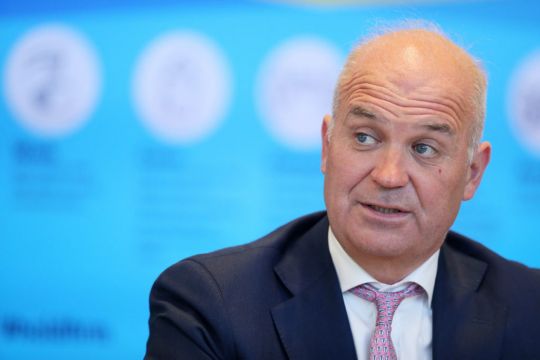Ireland’s chief medical officer has warned that a sharp increase in the number of Covid-19 cases show the disease is prevalent in the country’s communities again.
Dr Tony Holohan said the rise is a cause of concern and appealed to people who are not yet vaccinated to “hold firm”.
On Friday, the Department of Health reported an additional 631 confirmed cases of Covid-19 in Ireland.
There are 50 people in hospitals with the disease, of whom 15 were in intensive care units.
Dr Holohan said: “Today we are reporting over 600 confirmed cases of Covid-19 for the first time since late April. This is a cause of concern and shows that this disease is prevalent in our communities again.
“We know there is worry and frustration out there, particularly for young people who have had significant parts of their lives put on hold by this disease.
“We ask if you are not yet vaccinated, to hold firm to the public health advice as you await your vaccine. Please continue to manage your contacts, meet outdoors and avoid crowds. If you experience symptoms of Covid-19 or have any concerns, please isolate and seek a free PCR test as soon as possible.
“If you are not yet fully vaccinated and a close contact of a person that has tested positive for Covid-19, you also need to isolate and get a free PCR test.”
Earlier the head of the Health Service Executive (HSE) said that more than 54 per cent of the adult population is fully vaccinated.
More than 221,000 vaccines were administered in the first four days of the week.
Despite the concern over the growing number of Covid-19 cases associated with the Delta variant, Paul Reid said that the number of people in hospital with the virus is declining.
“Some good news for a Friday,” he tweeted.
“Another day yesterday of over 58,000 vaccinations administered and over 221,000 in the first four days of this week,” he said.
“Now over 54% of adult population are fully vaccinated.
“Thankfully Covid-19 patients in hospital reduced to 50 this morning.”
Legislation will be drafted over the weekend in order to allow Indoor Dining restart from 19th July, subject to passing a vote 🗳 of the Oireachtas
The window of opportunity to get indoor dining open is narrow.— Adrian Cummins 🇮🇪🇪🇺 (@adriancummins) July 9, 2021
Advertisement
It comes as talks between the Government and the hospitality industry are set to continue over the weekend over plans to reopen indoor dining.
Representatives of the industry are pushing for a reopening date of July 19th, however some in Government believe that plans will not be in place in time.
Some have suggested that July 26th is a more realistic date to have the system in place.
The new protocols to be put in place will restrict indoor dining to those who are fully vaccinated or have immunity from the virus after recovering from Covid-19.
Taoiseach Micheál Martin said that primary legislation will be required to put the new measures on a legal footing.
#COVIDVaccine registration is open for people aged 33. You'll need your PPSN, Eircode, mobile phone number & email address to register online. Don't worry if you can't register today, registration will stay open ➡️https://t.co/nTNxEKexNZ #ForUsAll pic.twitter.com/ytYLEh0NBu
— HSE Ireland (@HSELive) July 8, 2021
The legislation is set to make its way through the Dáil next week.
While it is expected to pass by the end of next week, there are doubts whether it will be in place for July 19th.
Government will also look at using a testing system as part of the resumption of indoor dining.
Meanwhile, a consultant has said that the spike in the number of people attending emergency departments has set a new record.
Dr Fergal Hickey, consultant in emergency medicine Sligo University Hospital, said that many emergency departments are under significant pressure.
“The trolley issue arises when we have finished patient’s emergency care but there is no bed for them to go to and that adds significantly to the burden of the department’s experience,” Dr Hickey told RTÉ.
“Emergency departments over the last few weeks have set new records for daily attendance.
“Given that these are new records, there are actually higher than the level we would expect to see over the winter period.
“If you add the effect of the Delta variant to that, that’s going to make it even more difficult.
“At the moment we cannot achieve social distancing, it’s simply impossible.
“The situation is dangerous and will become even more dangerous if we see more patients because of the Delta variant.”







